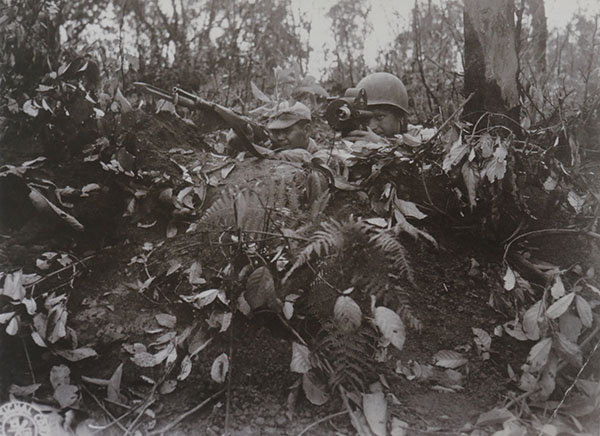Cameras and carbines capture life during wartime
By Zhao Xu (China Daily) Updated: 2015-07-30 07:57|
Camera and carbine: the dual weapons of the Photo Company. Photo Provided to China Daily |
Post-war 'pengyou'
After the war, Sydney Greenberg continued to take photos. He also served his hometown as justice of the peace for more than 40 years, a role that enabled him to "marry countless couples in his inimitable style of pomp, circumstance and levity", according to his obituary in the local newspaper.
He also gave regular lectures about his days in China, but despite his love of the country, he was reluctant to return. "He wanted the memories he had collected to remain undisturbed," Philip Greenberg said.
In 2011, the elder Greenberg was delighted to learn that a team of history enthusiasts from China, including Niu and Yan, was mounting an exhibition in Chongqing to showcase the work of the 164th Signal Photo Company. The 92-year-old veteran was invited to visit the exhibition, but was unable to travel because he was recovering after a car accident. Instead, he recorded a video to be shown at the opening of the exhibition: "A new and fascinating world was opened to me. You people took me in as a 'pengyou'", he told the audience, using the Chinese expression for "friend".
Sometime around 1944, Greenberg's fluency in Chinese brought him into contact with Chiang Kai-shek, the leader of the Nationalist government. "There's this great image of Chiang turning away from a gathering of reporters to smile at dad, who said 'Can I take your photo, sir Chinese," Philip Greenberg said.
Having been assigned to photograph Chiang during his flying inspection trips, the young soldier also taught the Nationalist leader how to use his 35mm Leica camera.
Earlier this year, while going through the photos he had copied at the National Archive in Washington, Yan stumbled over a "Greenberg" that had previously eluded him. "If you had been with me at the National Archive in 2010, you'd know how frequently we came across pictures with 'S.L. Greenberg' written on the back. But this picture is of, rather than by, Mr. Greenberg, so it's very precious," said Yan, who had corresponded with the old soldier by e-mail and wrote the family a letter of condolence when the veteran died. In the photo, Greenberg is shown sitting in an army jeep with five Chinese youths.
"Horror and amazement; a camera for a few years and an adventure of a lifetime - that's what China meant to dad," said Philip Greenberg, who, inspired by his father's example, became a photojournalist and undertook more than 2,300 assignments for major US newspapers and magazines. "I followed dad's work, and I became part of his legacy."
Reflecting on his father's experiences in wartime China, he said: "They (the Chinese) showed him kindness and gave him their time; he honors them daily in his photographs."
Zhang Yuchen contributed to this story.
Contact the writer at zhaoxu@chinadaily.com.cn






